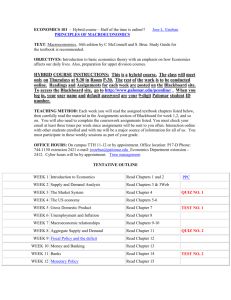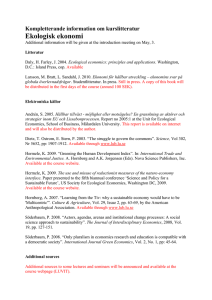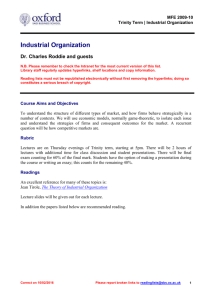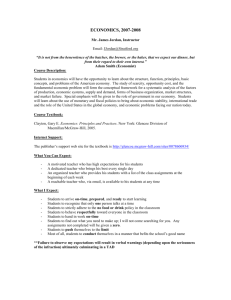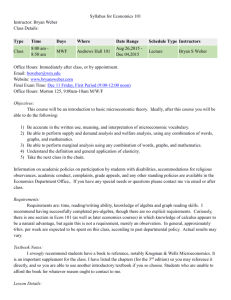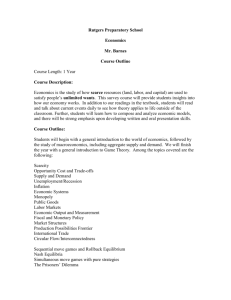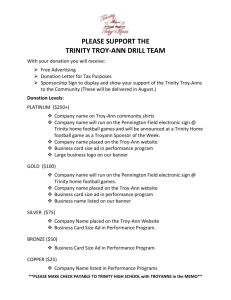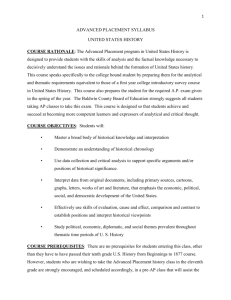Syllabus for World Economy
advertisement
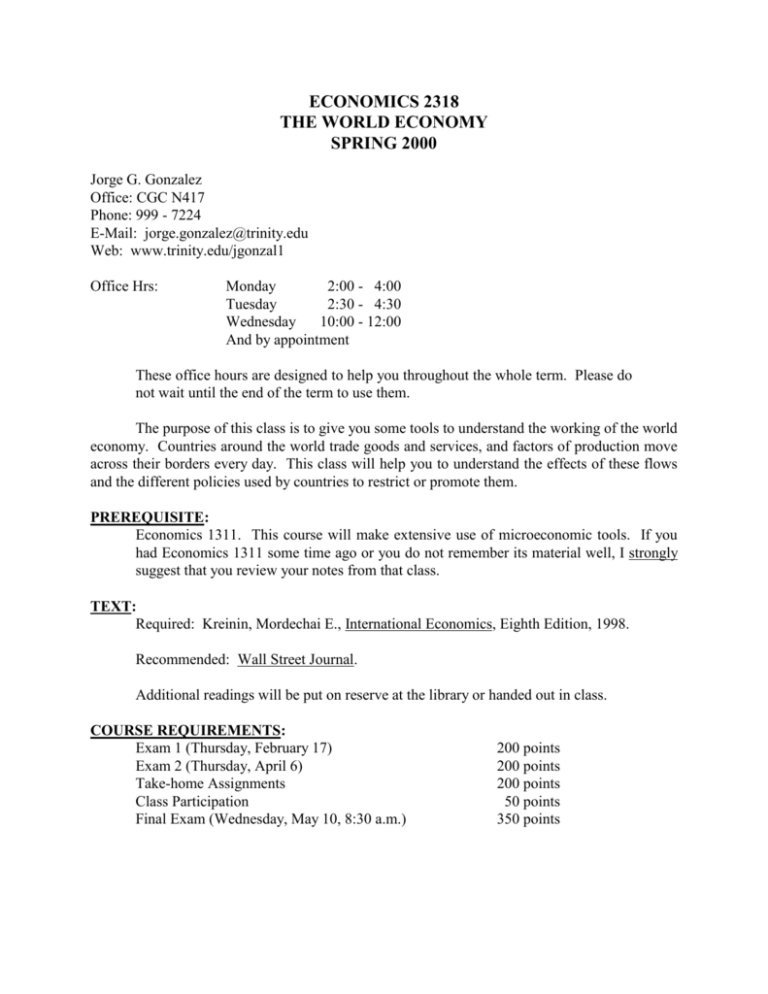
ECONOMICS 2318 THE WORLD ECONOMY SPRING 2000 Jorge G. Gonzalez Office: CGC N417 Phone: 999 - 7224 E-Mail: jorge.gonzalez@trinity.edu Web: www.trinity.edu/jgonzal1 Office Hrs: Monday 2:00 - 4:00 Tuesday 2:30 - 4:30 Wednesday 10:00 - 12:00 And by appointment These office hours are designed to help you throughout the whole term. Please do not wait until the end of the term to use them. The purpose of this class is to give you some tools to understand the working of the world economy. Countries around the world trade goods and services, and factors of production move across their borders every day. This class will help you to understand the effects of these flows and the different policies used by countries to restrict or promote them. PREREQUISITE: Economics 1311. This course will make extensive use of microeconomic tools. If you had Economics 1311 some time ago or you do not remember its material well, I strongly suggest that you review your notes from that class. TEXT: Required: Kreinin, Mordechai E., International Economics, Eighth Edition, 1998. Recommended: Wall Street Journal. Additional readings will be put on reserve at the library or handed out in class. COURSE REQUIREMENTS: Exam 1 (Thursday, February 17) Exam 2 (Thursday, April 6) Take-home Assignments Class Participation Final Exam (Wednesday, May 10, 8:30 a.m.) 200 points 200 points 200 points 50 points 350 points The take-home assignments will consist of problems sets that will be graded and several class assignments in the form of readings or problems to be done at home but that will not be handed in. Students are allowed and encouraged to do their problem sets in groups of 2 to 3 members. Students that decide to work in groups will only hand in one problem set per group and all group members will receive the same grade for the assignment. Those students that wish to work in groups should form their groups and inform me about their members by February 3. Students are allowed to quit their groups at any point during the semester, but these students will not be able to join another group. Class participation is strongly encouraged. Class participation is not only 5% of your grade but also decisions on borderline grades will take into consideration the class participation of the student during the term. Although class attendance is not directly represented as part of your grade, if you are absent from class you will miss points from class assignments and class participation and this will be reflected in your grade. There will be no make-up exams. Problem sets are due at the beginning of the stated class period. Under no circumstances will problem sets be accepted late. Cheating and plagiarism cannot be tolerated within the Trinity community. Any student who violates the regulations on academic integrity will be subject to the penalties described in Trinity University’s Student Handbook and 1999-2000 Academic Planner (pages 81-83). GRADING SCALE: Total Points 950 - 1000 900 - 949 870 - 899 830 - 869 800 - 829 770 - 799 730 - 769 700 - 729 650 - 699 600 - 649 Less than 600 Grade A AB+ B BC+ C CD+ D F COURSE OUTLINE: I. INTRODUCTION Kreinin Chapter 1. Weudenbaum, M., “American Isolationism versus the Global Economy,” Society, Vol. 33, No. 4, May 1996, pp. 54-58 Brecher, J., "Global Village or Global Pillage?," The Nation, Dec. 6, 1993, pp. 685-688. Lindsey, B., “The Great Contradiction,” Reason, July 1998, pp. 62-64. II. THE CONCEPT OF COMPARATIVE ADVANTAGE Kreinin Chapters 2 and 3. Burtless, G., “Worsening American Income Inequality: Blame?,” The Brookings Review, Spring 1996, pp. 26-31. Is World Trade to III. BARRIERS TO TRADE Kreinin Chapters 4 and 5. Newman, B., "The Greeks Have a Word for Banana But Lack Bananas," in J. Adams(1985). IV. COMMERCIAL POLICY AND ECONOMIC INTEGRATION Kreinin Chapters 6 and 7. Klitgaard, T., and K. Schiele, “Free versus Fair Trade: The Dumping Issue,” Current Issues in Economics and Finance, 1998, Vol. 4, No. 8, pp. 1-6. Gould, D.M., “Has NAFTA Changed North American Trade?,” Economic Review, Federal Reserve Bank of Dallas, First Quarter 1998, pp. 12-23. Kreinin, M.E., "The Uruguay Round and the Future of Trade Policy," The Globalization of Business in the 1990s: Implications for Trade and Investment, Vol. 1, 1994, pp. 3-14. Formaini, R.L., “Frédéric Bastiat: World-Class Economic Educator,” Economic Insights, The Federal Reserve Bank of Dallas, Vol. 3, No. 1. V. TRADE PROBLEMS OF DEVELOPING COUNTRIES Kreinin Chapter 8. VI. FACTOR MOVEMENTS Kreinin Chapter 9. Reich, R.B., "Who Is Us?," Harvard Business Review, January-February, 1990, 53-64. Gonzalez, J.G. and N. Kamdar, “Do Not Give Me Your Tired, Your Poor! Determinants of Legislator Voting on Immigration Issues,” Working Paper, Trinity University, December 1998. VII. BALANCE OF PAYMENTS ACCOUNTING Kreinin Chapter 10. VIII. INTERNATIONAL EXCHANGE RATES AND MARKETS Kreinin Chapters 11 and 12. Humpage, O.F., “A Hitchhiker’s Guide to Understanding Exchange Rates,” Economic Commentary, Federal Reserve Bank of Cleveland, January 1998. Bergsten, C.F., “The Dollar and the Euro,” Foreign Affairs, Vol. 76, No. 4, July/August 1997, pp. 83-95. IX. INTERNATIONAL TRADE AND THE ENVIRONMENT Bhagwati, J., "The Case for Free Trade," Scientific American, November 1993, pp. 42-49. Daly, H.E., "The Perils of Free Trade," Scientific American, November 1993, pp. 50-57.
